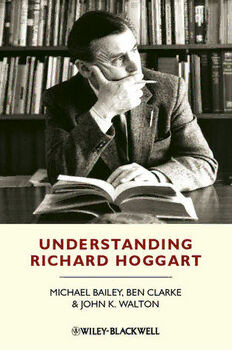
Understanding Richard Hoggart: A Pedagogy of Hope PDF
Preview Understanding Richard Hoggart: A Pedagogy of Hope
Understanding Richard Hoggart For all those who still value the idea of public culture and democratic criticism and aspire to a fuller intellectual and cultural way of life Understanding Richard Hoggart A Pedagogy of Hope Michael Bailey, Ben Clarke, and John K. Walton Thiseditionfirstpublished2012 (cid:2)2012BlackwellPublishingLtd BlackwellPublishingwasacquiredbyJohnWiley&SonsinFebruary2007. Blackwell’spublishingprogramhasbeenmergedwithWiley’sglobalScientific, Technical,andMedicalbusinesstoformWiley-Blackwell. RegisteredOffice JohnWiley&SonsLtd,TheAtrium,SouthernGate,Chichester,WestSussex, PO198SQ,UK EditorialOffices 350MainStreet,Malden,MA02148-5020,USA 9600GarsingtonRoad,Oxford,OX42DQ,UK TheAtrium,SouthernGate,Chichester,WestSussex,PO198SQ,UK Fordetailsofourglobaleditorialoffices,forcustomerservices,andforinformation abouthowtoapplyforpermissiontoreusethecopyrightmaterialinthisbook pleaseseeourwebsiteatwww.wiley.com/wiley-blackwell. TherightofMichaelBailey,BenClarke,andJohnK.Waltontobeidentifiedasthe authorsofthisworkhasbeenassertedinaccordancewiththeUKCopyright, DesignsandPatentsAct1988. Allrightsreserved.Nopartofthispublicationmaybereproduced,storedin aretrievalsystem,ortransmitted,inanyformorbyanymeans,electronic, mechanical,photocopying,recordingorotherwise,exceptaspermittedbythe UKCopyright,DesignsandPatentsAct1988,withoutthepriorpermissionof thepublisher. Wileyalsopublishesitsbooksinavarietyofelectronicformats.Somecontentthat appearsinprintmaynotbeavailableinelectronicbooks. Designationsusedbycompaniestodistinguishtheirproductsareoftenclaimedas trademarks.Allbrandnamesandproductnamesusedinthisbookaretradenames, servicemarks,trademarksorregisteredtrademarksoftheirrespectiveowners.The publisherisnotassociatedwithanyproductorvendormentionedinthisbook.This publicationisdesignedtoprovideaccurateandauthoritativeinformationinregard tothesubjectmattercovered.Itissoldontheunderstandingthatthepublisherisnot engagedinrenderingprofessionalservices.Ifprofessionaladviceorotherexpert assistanceisrequired,theservicesofacompetentprofessionalshouldbesought. LibraryofCongressCataloging-in-Publicationdataisavailableforthistitle. ISBN(HB)9781405193023 ISBN(PB)9781405194945 AcataloguerecordforthisbookisavailablefromtheBritishLibrary. Thisbookispublishedinthefollowingelectronicformats:ePDF9781444346541; WileyOnlineLibrary9781444346572;ePub9781444346558;MobiPocket 9781444346565 Setin10.5/13ptMinionbyThomsonDigital,Noida,India 1 2012 Contents Foreword viii Acknowledgements x Introduction 1 1 Literature, Language, and Politics 16 The Uses of Literature 18 Hoggart in Context:Post-warBritain and the Leavises 21 The Language of ‘Theory’ 30 The Common Reader 34 DemocraticCriticism 38 2 The Politics of Autobiography 49 Cultural Studies and Autobiography 51 Generic Conventions 54 Representing Working-Class Lives 59 SituatingtheCritic 66 3 Working-Class Intellectuals and Democratic Scholarship 73 Scholarship Boy 74 University Adult Education and theVarieties of Learning 76 The Grammar Schooland Working-ClassEducation 79 ‘Working-ClassIntellectuals’ and the‘Great Tradition’ 85 4 Cultural Studies and the Uses of History 94 History andCultural Studies 94 Locating RichardHoggart 96 Richard Hoggart and theEmergence of Social History 102 Historians and Richard Hoggart 119 ‘Nostalgia’, ‘Romanticism’, and ‘Sentimentality’: Recuperating Hoggart 122 vi Contents 5 Media, Culture, and Society 134 The BBC and Society 135 The Emergence of Commercial Broadcasting andPilkington 138 Diversity,Authority, and Quality 145 The Limits and Possibilities of Broadcasting in the Twenty-First Century 154 6 Policy, Pedagogy, and Intellectuals 181 An InternationalServant 183 The Idea of UniversityAdult Education 189 The Role of the Intellectual 194 Index 209 Come, my friends, ’Tis not too late to seek a newer world. Push off, and sitting well in order smite The sounding furrows; for my purpose holds To sail beyond the sunset, and the baths Of all the western stars, until I die. It may be that the gulfs will wash us down: It may be we shall touch the Happy Isles, And see the great Achilles, whom we knew. Though much is taken, much abides; and though We are not now that strength which in old days Moved earth and heaven; that which we are, we are; One equal temper of heroic hearts, Made weak by time and fate, but strong in will To strive, to seek, to find, and not to yield. (Alfred, Lord Tennyson, Ulysses, 1833) Foreword Iamgladtobeabletowriteaforewordtothisilluminatingbook.Itsauthors rightly insist on the continuing relevance of Richard’s work, which has coveredaspectsoflifethathavealwaysinterestedme.Heusedthephrase ‘aspects of working class life’ as part of the title of The Uses of Literacy, published in 1957, and it was that book which first brought us together. Itwouldbeaclich(cid:2)etosaythatsincethenourpathshaveoftencrossed. Particularaspectsofourtwoliveshaveoftendiffered,andourpathshave sometimes diverged, but we have had common experiences which un- doubtedly turn us into contemporaries. The title of another book of Richard’s, a collection of essays, Speaking to Each Other, would be an appropriatetitleforanyaccountofourlongrelationship,providedthatit incorporated the notion of speaking to others too. We have both had a strong sense of the public, and we do not merely want to observe it. ThreeyearsyoungerthanRichard,IwasProfessorofModernHistoryat Leeds,hishomecityandhisfirstuniversity,in1956whenhewaswritingThe UsesofLiteracywhilehewasanextramurallecturerinHull.Wewerefellow Yorkshiremen,althoughhehadbeenbroughtupinsurroundingsdifferent from mine. Keighley, a small town, contrasted with Hunslet, a distinctive part of a large city, which as Richard showed, had internal contrasts of its own. Itwasnotpropinquitythatbroughtustogether,however,butextramural education. I was then deputy president of the Workers’ Education Asso- ciation. It was because of that link that I enjoyed discussing Richard’s forthcomingbookwithhimindetailandindepth.Hisfirstmanuscriptwas toolong,andhefacedproblemsofcopyrightwithmanyofhisquotations. I was equally excited by his themes and his insights. We were on the same wavelength. That was a fitting metaphor for both of us. In the year that Richard publishedTheUsesofLiteracyIstartedworkonmyhistoryofbroadcasting. Foreword ix Andthereweretobefurtherconjunctionsinlivesthatweretobefarlonger thanweexpected.Thus,whenhewenttotheUniversityofBirminghamas foundingdirectoroftheCentreforContemporaryCulturalStudiesin1964 hewasmovingtoacitywhich,curiously,IknewfarbetterthanLeeds.Ihad published the second volume of The History of Birmingham in 1952. It stopped in 1938, and in 1962 Birmingham had already changed far more than Leeds since 1938. It has been difficult to keep up with more funda- mental changes. Richard’s interests in cultural studies were not local, however,butgeneral.Soweremine!IwasastrongsupporteroftheCentre while Richard was there and after he left it in 1970. That too changed. Ten years earlier Richard had been the most articulate member of the PilkingtonCommittee onBroadcasting between 1960and1962.This was themostuneasyperiodinmyrelationshipwithhim.Iwasnothappyeither whenhebecameAssistantDirector-GeneralofUNESCOin1971.Norwas he happy while working there. There was much ‘speaking to each other’ around this time, and with the help of the Leverhulme Trust I gave him temporary refuge in Sussex University when he left Paris in 1975. A new storyopenedupforhimayearlaterwhenhebecameWardenofGoldsmiths College, London, a story which I know little about. As Richard grew older he became more and more – and perhaps too – autobiographical,anditseemsfittingagainthatthesecondchapterinthis bookshouldbecalledthepoliticsofautobiographyandshouldendwitha section called ‘situating the critic’. I welcome the renaissance in critical studies of Richard’s work which straddle disciplines and consider his influence on others and his legacy. ItwasinaYorkshirecitywithahistoryverydifferentfromthatofLeeds, Sheffield,thatalandmarkconferencecalledTheUsesofRichardHoggartwas heldin2006inauniversitywithwhichhewasneverdirectlyassociated.This bookcontinuestheworkoftheconference,butitalsolookstothefuture.I think that Richard would approve of its subtitle A Pedagogy of Hope, for therecanbenoacceptablefuturewithouthope.Thisisabookwhichavoids nostalgia and which will appeal, I am sure, not only to his few surviving contemporaries but to a readership of people of all ages situated, if not always firmly, in their own times. Asa Briggs Lewes, February 2011 Acknowledgements Theauthorswouldliketoexpresstheirgratitudetothoseindividualswho helped with the preparation of this book. First of all, our thanks to colleagues for many different kinds of encouragement and help: Peter Bailey, Tony Bennett, Franco Bianchini, Lord Asa Briggs, Ros Brunt, Matthew Caygill, Rinella Cere, Claire Chambers, Sue Chaplin, Stefan Collini, John Corner, Nick Cox, Chas Critcher, James Curran, Mary Eagleton, Des Freedman, Juan Gracia, Simon Gunn, Audrey Guinchard, Ilan Gur-Ze’ev, Sir Martin Harris, Sylvia Harvey, Tom Herron, Dave Hesmondhalgh, Mike Kenny, Martin Jordan, Andrew Lawson, Jonathan Long,PhilLong,StephenMosley,SeanNixon,TomO’Malley,SueOwen, ChrisPawling,JulianPetley,StuartRawnsley,RuthRobbins,DaveRussell, Steve Sayers, Sheila Scraton, Jeremy Seabrook, Heather Shore, Laurajane Smith,GarethStanton,LisaTaylor,DorothyThompson,PaulThompson, NeilWashbourne,andSusanWatkins.WearegratefultoJackyHodgson, HeadofSpecialCollections,theUniversityofSheffieldLibrary,formaking available all the relevant documents within the Richard Hoggart archive. AndwewouldalsoliketothankJayneFargnoli andFelicityMarshatWiley- Blackwellfortheirinvaluablesupportandpatience.Last,butbynomeans least,wewishtoexpressourloveandappreciationtoFran,Abe,Thomas, Helena, Hugh, Gillian, Christine, and Lydia.
